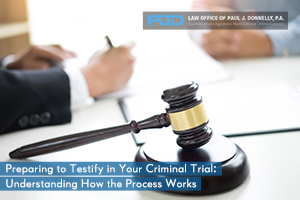- Federal Practice
-
State Practice
- Drug Crimes
- Possession of Cocaine in Florida
- Drug Possession
- Prescription Drugs
- MDMA – Molly Arrest
- Gun Crimes
- Sex Crimes
- Domestic Violence
- Violent Crimes
- Armed Robbery
- Car Jacking
- Homicide
- Manslaughter
- Violation of Probation
- Non-Florida Resident
- Theft Crimes
- Burglary
- Petty Theft/Shoplifting Charges
- Grand Theft Auto
- Receiving Stolen Property
- Misdemeanors
- Criminal Records
- Warrants
- DUI
- Multiple DUI Charges
When faced with criminal charges, it is natural to want to take the stand and testify on your own behalf. Most people, however, don’t realize testifying isn’t as simple as simply telling your version of events.
Testimony is governed by the Rules of Evidence, the Rules of Criminal Procedure, and the local rules of the courtroom. Part of preparing to testify includes learning some basic rules of court. Understanding the rules will assist you when you testify.
Understanding Direct Exam and Preparing to Testify
“Direct examination” refers to the examination done by your attorney. On direct exam, the rules require open ended questions. These questions look something like this:
- Who were you with?
- What were you doing?
- Where did you go that day?
- Why did you go there?
- When did you make that decision?
- How did you plan to get home?
These questions invite a narrative explanation. They do not suggest a specific answer. The intention of direct is to allow the witness to provide their recollection of events. On direct, it is essential to answer the question asked, and not launch into a narrative of events that haven’t been asked about. Your attorney knows the elements of the offense you are accused of, and your version of events, which constitute a defense. Trust your attorney has crafted a series of questions to bring out all legally relevant information. Just because a fact exists, this alone does not make it a relevant fact. Understand your attorney will focus only on relevant facts when asking you questions.
Understanding Cross Exam and Preparing to Testify
“Cross examination” refers to the examination done by the prosecutor when you are testifying in your criminal case. Like direct exam, there are rules about how to formulate questions. Cross exam questions generally call for a yes or no answer, without elaboration or explanation. These questions look something like this:
- You were with Susan?
- You and Susan were planning a surprise party that day?
- At around 2:00 p.m., you went to the Winn-Dixie?
- Was that to get a cake?
- You went there at 2:00 because that’s when you were told the cake would be ready for pick up?
- And your plan was to walk home, is that correct?
It is not uncommon for people to feel frustrated while being cross examined, because they want to provide additional information. This frustration is misplaced. It is essential you understand the prosecutor does not “get the last word,” leaving a misimpression with the jury. Once the cross examination is done, your attorney gets to “re-direct” the witness. Your attorney will take the time to ask you questions which allow you to clear up any misperceptions or supplement any answers you think might otherwise be incomplete.
Preparing to Testify: Trust Your Attorney
Sometimes, defendants in criminal trials express frustration their attorney did not, for example, redirect on the issue of whether the car was red or brown. While that detail may seem important as a factual dispute, if the color of the car has no bearing on guilt or innocence, most attorneys will simply let that discrepancy go. This is not because they don’t care. Rather, it is because they focus on facts that are relevant and go to the ultimate question of guilt or innocence. They don’t want the jury bogged down in unnecessary detail.
Facing criminal charges is very scary. It is essential you have an attorney you can trust to advocate for your best interests every step of the way. Paul J. Donnelly has over twenty years of experience as a criminal defense attorney. Contact our Miami Criminal Lawyer at (305) 757-3331 to discuss your case.
Additional Reading
Criminal Law: What is the Art of Discrediting a Witness?
The Scientific Strategy Behind Your Criminal Defense Case

